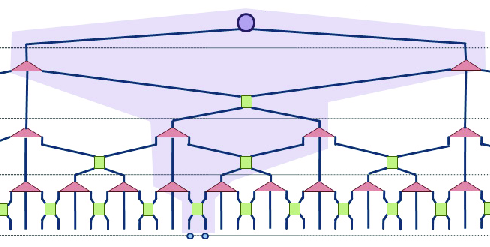
Disentangling quantum matter with quantum information theory
Venue: Seminar Room, New Building.
Organizers: David Gross and Simon Trebst.
Announcements
Last talk pushed back one week due to illness!
Course description
Entanglement originally entered physics in the context of foundational questions. Entangled states give rise to Bell inequality violations, which prove that correlations between separated quantum particles can be stronger than any classical concept of Nature allows for. During its initial years, the focus of quantum information theory was to build a quantitative and rigorous theory of entanglement, mainly with applications to communication and computation tasks in mind.
In recent years, the utility of entanglement theory for condensed matter physics has increasingly become appreciated. For example, the entanglement structure of ground-states of gapped systems in one dimension is now rigorously understood. This result allows for a precise analysis of the performance of some well-known algorithms of computational condensed matter physics (e.g. density matrix renormalization group [DMRG]). Going beyond this, during the development of the theory of topological order over the past few years, condensed matter theory and quantum information have worked so closely together that the distinction between the two fields has almost ceased to exist.
The seminar will give an introduction to the concept of entanglement, its origins in quantum information theory, and applications to many-body physics.
Prerequisites
A solid understanding of quantum mechanics. Condensed matter theory courses and the Advanced Quantum Mechanics lecture would provide a helpful foundation, but are not strictly necessary.
Talks
| 29.04 |
Foundations of Entanglement: Bell Inequalities, Separability
Felix Weidenmüler (Rafael Chaves) Summary |
| 06.05 |
Quantitative Entanglement Measures
Tilman Disselkamp (Lukasz Rudnicki) Summary |
| 13.05 |
Area Laws: Ground States, Gaped vs Gapless Systems
David (Zala Lenarcic) |
| 20.05 |
No Talk
(Pfingstwoche) |
| 27.05 |
Matrix Product Representation: Formalism, Local Observables
Bahareh Ghannad (Zala Lenarcic) |
| 03.06 |
Variational Methods: DMRG, PEPS, MERA
Tim Eschmann (Finn Lasse Büssen) |
| 10.06 |
No Talk
(Pause) |
| 17.06 |
Projective Symmetries
Ulrich Michel (Kevin O'Brien) Summary |
| 24.06 | Hamiltonian Complexity Felipe Montealegre (Daniel Suess) |
| 01.07 | Quantum Error Correction Codes Dennis Wawrzik (Johan Aberg) |
| 08.07 | Topological States: Kitaev's Toric Code Philipp Klein (Kevin O'Brien) Summary |
| 22.07 |
Entanglement as a Resource for Quantum Computation
Jan Attig (David Gross / Zala Lenarcic) Summary |
